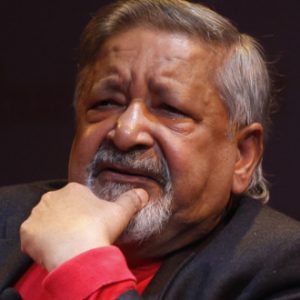Three countries – Trinidad, Britain, India. One writer – V. S. Naipaul. Not a lot of love
 Everyone who matters (and some of those who don’t) has been commenting on the passing of V. S. Naipaul. But who is appropriating him in death?
Everyone who matters (and some of those who don’t) has been commenting on the passing of V. S. Naipaul. But who is appropriating him in death?
Think about that. The fact that almost no country or people is fully claiming the Nobel Prize-winning writer.
Not Trinidad, where he was born; not Britain, where he lived; not India, from where his ancestors were taken as indentured labour in the 19th century.
Why?
It’s not because Naipaul was, in his own way of seeing, a man without a place. It’s not because he had a wide canvas for commentary from places he ‘knew’ in his bones or by close examination. It’s not because he went even further than those places. Controversially, he went into Africa, for instance.
Perhaps it’s because Naipaul pleased no one but dedicated readers, people content to submerse themselves in what he brought to a narrative without worrying about the politics and political correctness of the writer.
That’s not surprising.
Naipaul reviled every place that was somehow linked to him.
Of Trinidad, just to quote two fragments of what he said:
** “Nothing was made in Trinidad.”
** “Trinidad may seem complex, but to anyone who knows it, it is a simple, colonial, philistine society.”
Of India, Naipaul wrote:
** “The poverty of the land is reflected in the poverty of the mind: it would be calamitous if it were otherwise.”
** “No civilization was so little equipped to cope with the outside world: no country was so easily raided and plundered, and learned so little from its disasters.”
Of Britain, Naipaul had this to say:
** “In England people are very proud of being very stupid.”
** “The ancillary aspect of every British city now is the council estate.”
And of Africa, which was not technically his stamping ground, Naipaul was visceral:
** “Africa has no future.”
** “Africans need to be kicked, that’s the only thing they understand.”
** “Africa is not a fun place, you know. A fun place is somewhere that lifts the spirits, that cossets the senses. I don’t think that can be said of the Africa I traveled in.”
India was greatly irritated by Naipaul, especially the notion (put about in elegant prose) that it’s a country without a sense of history.
Trinidad resented his constant put-downs and attempt to escape the reality of having been born there. He once said: “In England I am not English, in India I am not Indian. I am chained to the 1,000 square miles that is Trinidad; but I will evade that fate yet.” In April 2007, after an extraordinary high school event attended by Naipaul in Trinidad, a participating student wrote the following:
“Our small country has not produced many people that have attained your importance, so we had to be proud of you. We had to be proud to say you were a Trinidadian, but are you proud to be a Trinidadian? I can say now, that when I hear the name VS Naipaul, I will say he is not a great person, he is not an icon, he is not my idol, I do not look up to him, he is not a Trinidadian.”
Britain said a great deal less about Naipaul, except to let him get on with being a writer on its soil.
Perhaps that is the right way to deal with a man who expresses disagreeable opinions so beautifully. Read him, rant if you must at the dog, but for god’s sakes, let the man write.

